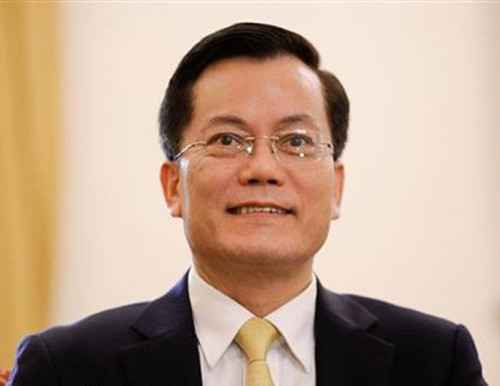
Deputy Minister for Foreign Affairs Ha Kim Ngoc talks about the cultural diplomacy achievements of the past year.
Could you highlight the cultural diplomacy achievements of Vietnam last year?
After a year of implementing the Strategy on Cultural Diplomacy to 2030, issued by the Prime Minister in November 2021, Vietnam's cultural diplomacy has achieved markedly results.
The country has promoted and deepened relations with other countries through multilateral cultural diplomacy.
Last year, we hosted significant regional and international conferences and events, including the 31st SEA Games and the Vietnam Day Programme in South Korea, Austria and India.
Furthermore, promoting deep and wide integration in the fields of culture, science and education was a success at international forums, particularly the United Nations Educational, Scientific and Cultural Organization (UNESCO).
Vietnam was elected to the Intergovernmental Committee of the UNESCO Convention for the Safeguarding of Intangible Cultural Heritage for the 2022-2026 term with the highest number of votes.
The first official visit to Vietnam by UNESCO Director-General Audrey Azoulay was a highlight. The world media reported news and images about the country, culture and people of Vietnam.
The UNESCO Director-General said she was impressed with our achievements in the fields of culture, science and education on her page.
Last year, we had four heritages and titles recognised by UNESCO, including the art of pottery making of the Cham ethnic people being inscribed on the list of intangible cultural heritage in need of urgent safeguarding; the Ma Nhai (Inscriptions) in ancient Nôm and Han Chinese characters on the Marble Mountains in Da Nang and Han-Nôm character documents (1689-1943) in Truong Luu Village of Ha Tinh Province being recognised as part of documentary heritage in Asia and the Pacific were recognised as part of documentary heritage in Asia and the Pacific. Cao Lanh City of the Mekong Delta province of Dong Thap was added to the UNESCO Global Network of Learning Cities.
Many localities successfully organised big cultural and diplomatic events, enhancing the conservation and promotion of regional heritage and cultural values, arousing national pride and solidarity, attracting investment, tourism and creating resources for sustainable development goals.
Cultural diplomacy has contributed to promoting cultural values and the image of the country and people of Vietnam, especially progressive and beautiful human and world views of Vietnam through spreading the ideological and character values of President Ho Chi Minh and prominent figures honoured by UNESCO, such as poets Nguyen Dinh Chieu and Ho Xuan Huong.
In addition, the application of science and technology made the Vietnam Days abroad vivid and effective in conveying domestic and foreign policies and spreading Vietnamese cultural values to the international community.
How do these achievements publicize the image of Vietnam?
These achievements show the international community's appreciation for the heritage and cultural values of Vietnam, making Vietnam an attractive cultural destination and putting it on the map of cultural and natural heritage and documents of the world.
Access to regulations and commitments set out by UNESCO has helped Vietnam raise the standard of management, conservation and promotion of heritage values, integrating heritage protection in local development strategy planning and striking a balance between conservation and development towards sustainable development.
The image of a beautiful and modern Vietnam with friendly and hospitable people and a unique and diverse culture is more widely known to friends worldwide.
What should we do to help raise Vietnam’s position in the international arena?
In the context that the world situation is complicated and unpredictable, especially since the scientific-technological revolution will create strong and multi-dimensional impacts, countries will increasingly attach importance to the role of cultural diplomacy in promoting the national image and enhancing soft power.
For Vietnam, the Cultural Diplomacy Strategy to 2030 has identified cultural diplomacy through tools in diplomacy contributing to promoting the image of the country, culture and people of Vietnam to the international community, honouring the intellect, qualities, characters, and ideology of the Vietnamese people.
We need to continue to research and innovate to promote our national image, culture and people to the world, integrating cultural promotion activities with trade promotion programmes and building national and local brands so that culture becomes an endogenous force attracting external resources, especially intellectual, technology and investment for socio-economic development.
Furthermore, cultural diplomacy activities must be deployed more and more creatively with the smooth coordination of ministries, branches, localities and overseas Vietnamese.
Overseas Vietnamese are cultural ambassadors that publicize Vietnamese culture in foreign countries.
In the fourth industrial revolution, cultural diplomacy needs to quickly access new knowledge to make the most of resources that serve the country's sustainable development, especially in the fields of cultural industry, creative industry and international cooperation in science and technology and education and training.
It is necessary to strengthen the combination of the soft power of culture with the communication strategy to increase the national synergy in which attention should be paid to taking advantage of the strengths of digital products along with the strategy of building a system of high-quality cultural diplomacy products that meet the diverse characteristics and needs of the beneficiaries of international community, especially young people and people at home and abroad.
Source: Vietnam News